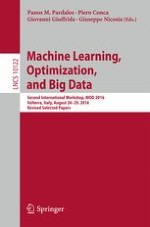2016 | OriginalPaper | Chapter
The Learnability of Business Rules
Authors : Olivier Wang, Changhai Ke, Leo Liberti, Christian de Sainte Marie
Published in: Machine Learning, Optimization, and Big Data
Publisher: Springer International Publishing
Activate our intelligent search to find suitable subject content or patents.
Select sections of text to find matching patents with Artificial Intelligence. powered by
Select sections of text to find additional relevant content using AI-assisted search. powered by
